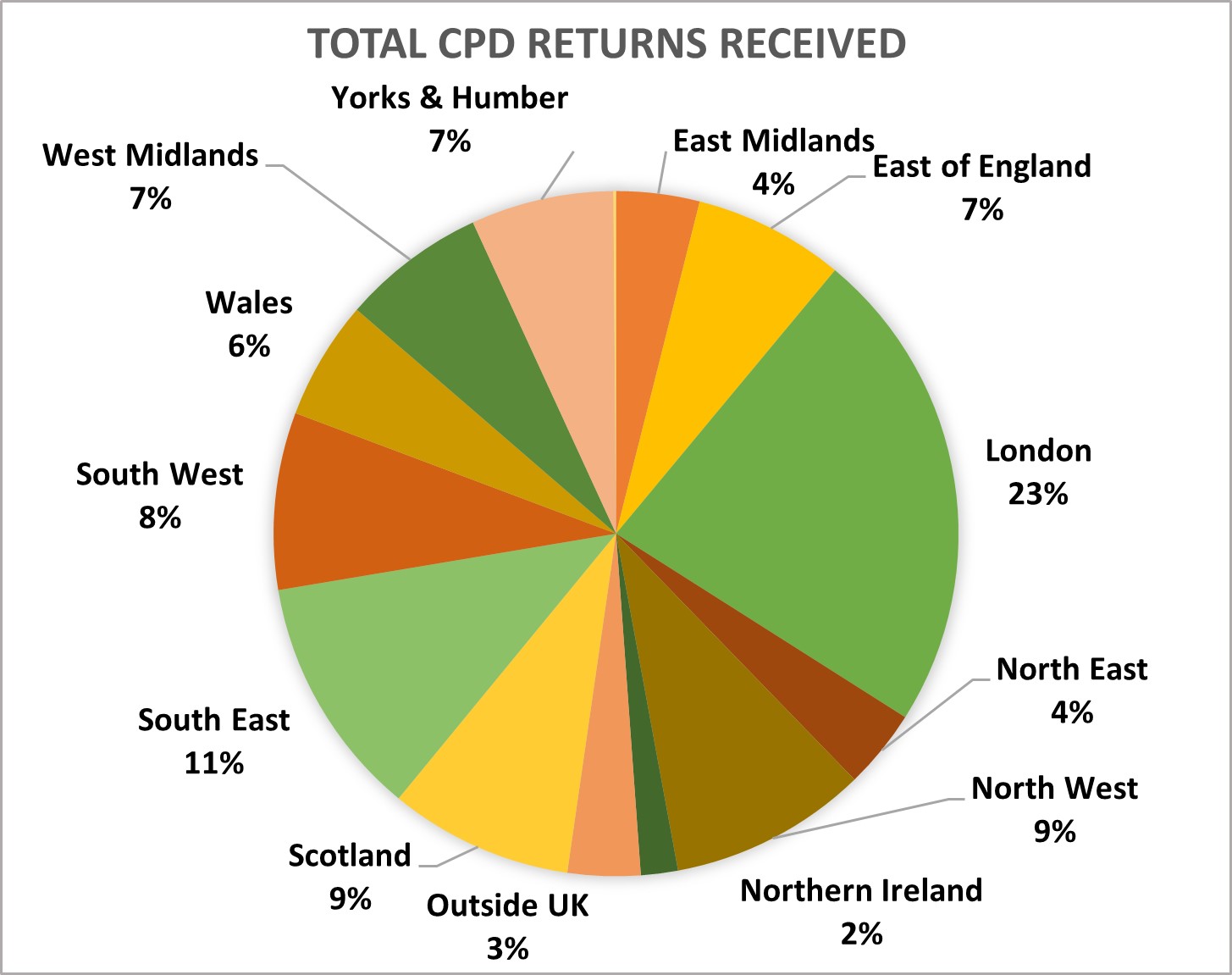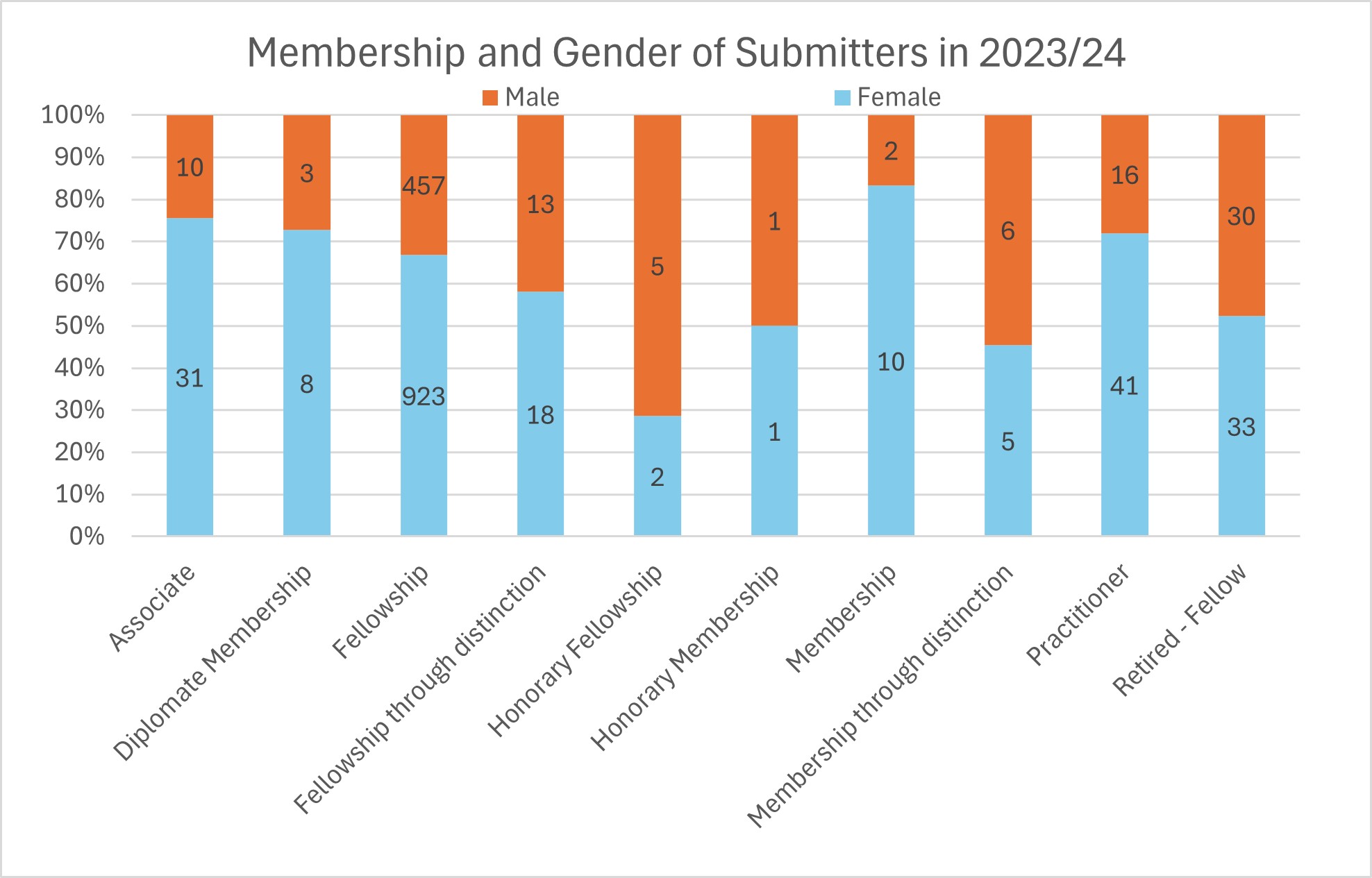Submissions of CPD returns for 2023/24
The last full CPD submission year was before the pandemic in 2018/19 and 1,601 returns were received. For the CPD year 2022/23, 1502 CPD returns were received. This decrease in numbers can be explained by potentially two important factors:
- The switch to a new CPD diary system to record and submit.
- The return to ‘normal’ after three years of suspension of formal CPD requirements due to the COVID-19 pandemic.
For the CPD year ending on 31 March 2024, 1,603 annual returns were submitted by FPH members.
Breakdown of submission by regions
|
Regions |
CPD Returns |
|
East Midlands |
63 |
|
East of England |
114 |
|
London |
368 |
|
North East |
60 |
|
North West |
150 |
|
Northern Ireland |
28 |
|
Outside UK |
55 |
|
Scotland |
139 |
|
South East |
183 |
|
South West |
134 |
|
Wales |
90 |
|
West Midlands |
109 |
|
Yorks & Humber |
108 |
|
Blank |
2 |
|
Total |
1603 |


Breakdown of submissions by membership grades and gender


Non-Submitters
As per the new CPD policy, members who fail to submit an annual return will receive a letter from the CPD Director reminding them of the requirement to submit an annual CPD return, unless exempt from CPD. This letter was sent by email in June 2024 to 94 non-submitters.
Following the new CPD policy, members who fail to submit an annual CPD return for a second year will receive a letter from the Registrar inviting them to discuss the reasons for their non-submission. Members who subsequently fail to make contact within three months will receive a second letter from the Registrar informing them that their name will be submitted to the FPH Board for removal of membership under Standing Order 15. The letter will also inform the member they must discuss this with their line manager and professional appraiser. A letter will be sent to the member’s responsible officer informing them that the member is not in good standing with the FPH and is pending removal of membership.
Summary of CPD submissions in 2023-24
|
Region |
CPD submissions |
Members in region (in CPD) |
Non submitters |
% non-submitters |
|
East Midlands |
63 |
66 |
3 |
5% |
|
East of England |
114 |
115 |
1 |
1% |
|
London |
368 |
387 |
19 |
5% |
|
North East |
60 |
66 |
6 |
9% |
|
North West |
150 |
158 |
8 |
5% |
|
Northern Ireland |
28 |
30 |
2 |
7% |
|
Outside UK |
55 |
70 |
15 |
21% |
|
Scotland |
139 |
146 |
7 |
5% |
|
South East |
183 |
188 |
5 |
3% |
|
South West |
134 |
141 |
7 |
5% |
|
Wales |
90 |
93 |
3 |
3% |
|
West Midlands |
109 |
111 |
2 |
2% |
|
Yorks & Humber |
108 |
109 |
1 |
1% |
|
Total/Average |
1603 |
1682 |
79 |
5% |
Summary of CPD submissions in 2022-23
|
Region |
CPD submissions |
Members in region (in CPD) |
Non submitters |
% non-submitters |
|
East Midlands |
60 |
62 |
2 |
3% |
|
East of England |
100 |
104 |
4 |
4% |
|
London |
333 |
350 |
17 |
5% |
|
North East |
59 |
63 |
4 |
6% |
|
North West |
141 |
145 |
4 |
3% |
|
Northern Ireland |
30 |
31 |
1 |
3% |
|
Outside UK |
50 |
66 |
16 |
24% |
|
Scotland |
135 |
140 |
5 |
4% |
|
South East |
168 |
174 |
6 |
3% |
|
South West |
133 |
134 |
1 |
1% |
|
Wales |
87 |
91 |
4 |
4% |
|
West Midlands |
108 |
111 |
3 |
3% |
|
Yorks & Humber |
96 |
100 |
4 |
4% |
|
Average |
1502 |
1574 |
72 |
5% |
Opt-in tick box
In 2022/23 700 members opted-in to take part in the annual review. This represented 46% of submitters. We are unsure if members tick the two boxes before submitting without reading them, and therefore this ended up in a massive opt-in movement, or if people genuinely are opting-in. For this reason, this option was removed in 2023/24 CPD year and instead increase the % of random selection from 5% to 7.5%.
Annual review
The annual review process started in May 2024 and 119 submissions were randomly selected by the system. This meant that each of the 14 CPD reviewers had 8 or 9 reviews to complete.
Overall, the quality of submissions from members reviewed seems very strong with the vast majority of reflective notes submitted being of fair or good quality. This continues the trajectory from last year. Additionally, the comments and guidance given back to the members by the CPD advisers was of a higher quality and more robust than previous years – after taking on board comments from last year’s process and improved training delivered to CPD advisers as well as providing better resources for the advisers.
Of the 119 submissions randomly selected for review by the committee this year just under 1/5 (21/119) were deemed as being of poor quality and members were encouraged to familiarise themselves with the latest CPD policy, access the Faculty tips on writing reflective notes and make contact with their regional CPD advisers for further support. The committee expects members receiving these comments to take forward their own learning and reach out if they feel they need further support. However, CPD advisers are not expected to follow-up these individuals unless members themselves make primary contact.
Furthermore, 53% of the submissions were qualitatively assessed as being of good quality and the further 29% of a reasonable/fair quality reflective note – which could do with some improvements but still managed to convey aspects of new learning and its impact on professional practice. Of the 119 submissions about six were identified as being of very high quality and these six individuals may be contacted to see if they can share their anonymised reflection as good practice for other members.
The new policy stipulates that members submit between three and six reflective notes and the average submission of these 119 was 4.1 reflective notes per member. The 18% that were deemed of poor quality submitted, on average, 4.2 reflective notes per submission. Therefore, there is no difference in the number of reflective notes submitted and poor quality of reflection.
Nevertheless, as suspected most members tend towards the lower end of submission ranges. Only 17 members submitted six reflective notes for review, and six of these members submissions were deemed of poor quality requiring significant improvements.
The CPD Director requested additional information to be sent to 8 members in the feedback form which principally highlighted the need for further signposting to members on where to access additional resources to improve their reflective practice. Most of the comments in the reviews sent back to the members were detailed and provided good comments as to the strengths and areas for improvement. There is more consistency in the comments given back to the members this year than the previous year which indicates that the CPD advisers have taken on board the training and support that has been offered. Nevertheless, this process is constantly under review and further tweaks will be recommended to the CPD advisers for implementation/suggestion next year.
Feedback
Feedback from CPD Advisers
- From my perspective the general quality of reflective notes was improved. Colleagues appeared to be engaging in the process.
- The review process took a couple of hours and the better-quality reflective notes provided a vicarious learning opportunity.
- I definitely found the 2023-24 reviews easier; I think the structured training was really useful.
- Should flag we have gaps in regional cover, which might mean we are not picking up totality of the picture. I really enjoy using a different part of my brain / skill set in the CPD committee, to the day job. I think an aspect of this is the peer support CPD advisors receive through the committee and excellent administrative support.
Feedback from members
- Much better than it was - more about learning and reflection, less about box ticking.
- Removing hours focus and instead reflective notes is significant improvement.
- Support around demonstrating more of the clinical competencies required by the GMC and examples particularly around quality improvement.
- A bit more guidance about what good looks like in terms of proportionate levels of detail to include in reflective notes.
- Clarity for those in academic public health.
- I am a professional appraiser and many newer consultants are doing the bare minimum. With no audit I feel the quality is now minimal.
- I'd like the requirements to be tightened up. Requiring a minimum of three reflections when comparable professions still require 50 CPD points feels a bit lax.
- Some areas of CPD should be 'required', e.g. CPD on climate change. It is a FPH priority and yet many members do not see it as such and do not see how to integrate it into their day-to-day work and make it mainstream. ALL members should be 'required' to do CPD on climate change and health. There is good educational evidence that people 'chose' to do CPD on areas they are already familiar with however it is the areas they are not familiar with (e.g. climate and health) where they NEED to do CPD and where there are better outcomes to their learning, than those areas they are familiar with.
Our Current CPD Committee
|
Person |
Role |
|
Alison Bell |
CPD Adviser, South West |
|
Andrew Terrell |
CPD Adviser, non-region specific |
|
Catherine Coyle |
CPD Adviser, Northern Ireland |
|
Daniel Showell |
CPD Adviser, East of England |
|
Dianne Draper |
CPD Adviser, North West |
|
Durka Dougall |
CPD Adviser, London |
|
Edward Kunonga |
CPD Adviser, North East |
|
Karen Saunders |
CPD Adviser, non-region specific |
|
Lola Abudu |
CPD Adviser, West Midlands |
|
Megan Harris |
CPD Adviser, Wales |
|
Muna Abdel Aziz |
International Committee representative |
|
Naveed Syed |
Director of CPD/ Chair of CPD Committee |
|
Padmanabhan Badrinath |
CPD Adviser, non-region specific |
|
Rachel Cloke |
CPD Adviser, Scotland |
|
Thara Raj |
CPD Adviser, non-region specific |
|
Toni Williams |
CPD Adviser, Yorkshire & The Humber |
Thank you
We would like to express our deep gratitude to following CPD Advisers who finished their terms in summer 2024, Jeptepkeny Ronoh, Lucy Denvir and Muhammad Abid. Your work supporting CPD committee has been greatly appreciated.


